We may yet remember 2020 as the year that apathy died. During the pandemic, billions of people have been compelled to live, breathe and engage, with a directness that for many was totally unprecedented, with the impact of political choices and top-down decisions made in the countries they call home. Crises such as this have a way of holding a mirror up to society, exposing the pre-existing cracks and faults as well as the often-forgotten good. Nowhere has this been truer than in the Islamic Republic of Iran. The national tragedy that befell Iran this year has thrown into even sharper relief the self-interested and criminal comportment of Iran’s current regime. More than 100,000 Iranian lives have been lost to Covid-19 and the country has yet to fully come to terms with the economic and whole-societal devastation of the pandemic. But this been has matched by the remarkable fortitude, resourcefulness and bravery of the Iranian people, some of whose stories we have been honored to document this year.
With scientists newly collaborating on cross-border research, and individuals all over the world seeing their lives rocked by the same, non-human cause, 2020 was also the year that reminded us we are all citizens of the world, and we all depend on each other. To this end, this year IranWire continued to document some of the most important challenges that Iran will have to overcome, both in order to progress as a nation and for the betterment of the global community. The following is our round-up of some of the most significant events that took place this year with regard to coronavirus, human rights, freedom of expression, the Supreme Leader of the Islamic Republic, and the treatment of religious minorities in Iran.
Coronavirus
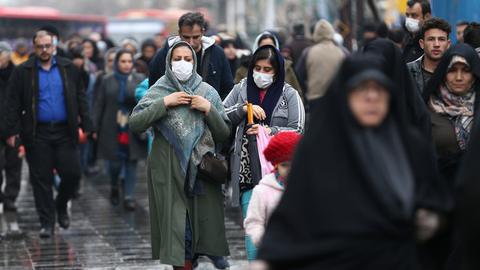
Like many countries that experienced an early, severe outbreak of coronavirus in 2020, the Iranian government was slow to respond to the epidemic, at least in part due to regime security concerns. The first death from Covid-19 in Qom is now thought to have taken place on January 21 but, despite the mounting evidence of a public health emergency before their eyes, Iranian officials failed to acknowledge the outbreak until February 19. This lethal waste of time was then compounded by a failure to quarantine the city of Qom for religious and economic reasons. With schools closed in Tehran and Qom, and inter-city travel and religious pilgrimages continuing apace, coronavirus spread fast into neighboring provinces and ran rampant throughout the rest of the country.
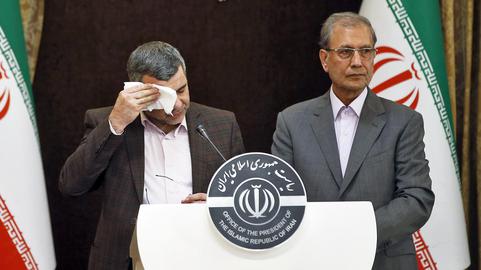
From the very beginning, the Iranian regime’s response – from the powerful Shia clergy to the Revolutionary Guards (IRGC), to Ministry of Health officials to state-controlled media – was first to stifle, then to confound the issue of Covid-19 through conflicting claims, disinformation and censorship. Bad science and conspiracy theories clouded public understanding of SARS-CoV-2, while officials clashed in their stated versions of events, confusing the Iranian public at a time when clear messaging was critical. From mid-February, journalists, ordinary citizens, medical staff and even politicians were subjected to threats, harassment and arrest for trying to address the issue in a meaningful way – though many doctors and nurses told IranWire of their harrowing experiences on the ground throughout 2020.
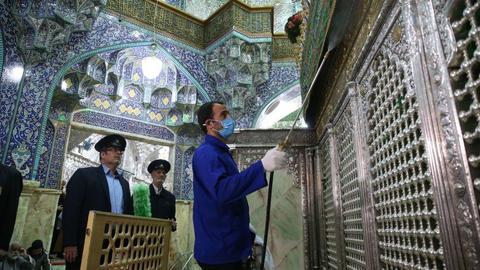
The response to the pandemic in Iran was hampered at every step by ulterior concerns. First, parliamentary elections on February 21 delayed any public health interventions being instigated. Then the first round of heavy restrictions came to an end prematurely in late April because of the need to revive the economy. Thousands-strong mass mourning ceremonies took place for the Shia month of Muharram in August – not because it was safe, but because religious events are an important buttressing tool for the Islamic regime – and schools then reopened in September. Financial strain, bad management and corruption going back years blighted the ability of health workers to cope with the crisis, with shortages of everything from masks to ventilators to ICU beds. Though the Iranian Ministry of Health has never reported the correct figures on Covid-19 cases and deaths, early evidence suggests that it is the poorest and most deprived provinces in Iran, as well as frontline medical staff, who have suffered the most in the pandemic.
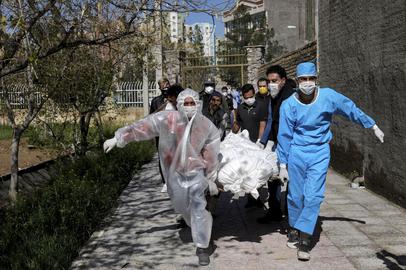
In Iran, coronavirus was ultimately treated by the state as a national security issue instead of a health issue, with some irony in a country where the actions of an unaccountable state evidently pose the greatest security threat of all. With the epidemic still ongoing, debate is now swirling over if and when a foreign-made vaccine can be made available to the Iranian public. It falls to the Iranian state to ensure a vaccine can be secured, and soon – and to make sure that in the aftermath of the year that was, the people trust health officials enough to take it.
Human Rights
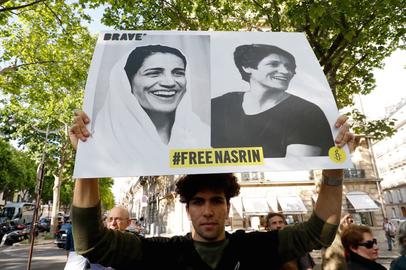
The push-back against endemic human rights abuses in Iran continued apace in 2020, spearheaded by courageous activists inside the country, a growing chorus of dissent on social media and international institutions from Amnesty International to the United Nations. Just last week, the European Union near-unanimously passed a fresh resolution condemning arbitrary detentions, torture and political hostage-taking in the Islamic Republic. The declaration also gave EU member-states the green light to pursue so-called Magnitsky sanctions against individuals involved in gross human rights abuses in Iran, such as the “hanging judges” of the Revolutionary Courts.
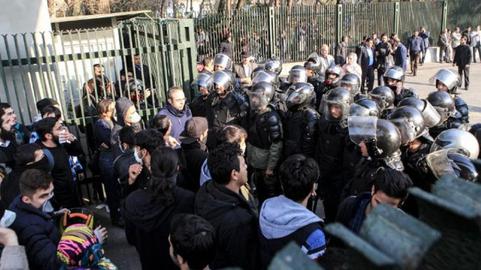
This came at the close of a year of worsening impunity and brutality on the part of the Iranian regime. The year had begun with the mass detention of hundreds of Iranian citizens and civil activists for taking part in the November 2019 protests. Many of these people, such as mother-of-three Fatemeh Davand, who spoke to IranWire in August, were jailed after grossly unfair trials and being coerced into giving false “confessions” for state TV. One young man, Nader Mokhtari, died in September after being viciously beaten in custody. Other people were handed the death penalty by the Revolutionary Courts, including Amirhossein Moradi, Saeed Tamjidi and Mohammad Rajabi, whose sentencing in June sparked an international social media campaign that led to their execution being postponed. In October, thousands of Iranians took part in a Twitter campaign to testify against atrocities committed in their country since 1979, including the killing of hundreds of people by security forces in November 2019.

On September 12, 2020, the Iranian wrestler Navid Afkari was hanged in Adel Abad Prison, Shiraz, sparking a global outcry. Navid and his two brothers, Vahid and Habib, who were each sentenced to 54 and 27 years in prison, had been arrested in September 2018 for taking part in protests and tortured into giving false confessions. The case drew condemnation from all quarters including from US President Donald Trump, a consortium of Swedish politicians and the International Olympic Committee, and sparked fresh scrutiny of the atrocities being committed against innocent people by the Iranian regime. Other activists arrested prior to 2020 also continued to face maltreatment this year. Women’s rights defender Saba Kord Afshari, for instance, was denied the right to a retrial in November after being sentenced to 24 years in prison for removing her hijab, while three prominent members of the Iranian Writers’ Association were summoned to prison in September to begin serving a cumulative 18 years behind bars, despite the ongoing coronavirus epidemic. The year also saw some disturbing new trends in the regime’s trampling on human rights, including the transferal of political prisoners to insane asylums as a form of “punishment”, and increased surveillance of Iranian lawyers.
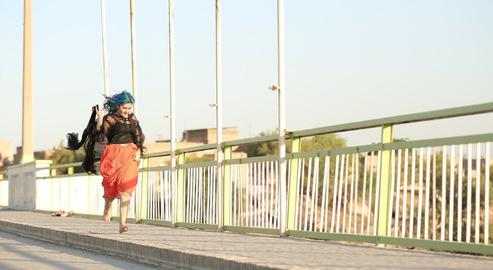
At the same time, activists and human rights defenders in Iran continued to inspire change with their bravery and resilience. Anti-death penalty campaigner Narges Mohammadi was released from prison in October and in her first post-release interview with IranWire, declared she would continue to fight as “struggle and resistance are defined as my course in life”. The remarkable life and career of Nasrin Sotoudeh, a human rights lawyer facing 34 years in prison for her defense of peaceful protesters in Iran, were documented in a feature film that premiered in November and drew renewed attention to the case around the world. It came months after Sotoudeh had gone on hunger strike in protest against conditions in Evin Prison. In July IranWire also published the prison diaries of Sepideh Gholian, a labor rights campaigner jailed for documenting protests at the Haft-Tappeh sugarcane factory. Ahead of the digital launch of her memoir in English, which was attended by representatives from Frontline Defenders, Human Rights Watch and the UN Special Rapporteur on Cultural Rights, Sepideh was able to convey a message to IranWire from Evin Prison. “For me,” she said, “prison means the continuity of my protest, my resistance against this system.”
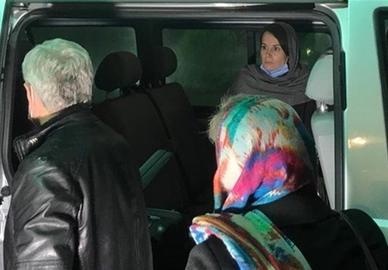
Iran’s targeting of dual nationals also continued in 2020. Although Iranian-British citizen Nazanin Zaghari-Ratcliffe was temporarily released from prison in March because of the pandemic, she remains under house arrest at her parents’ home, as authorities continue to hold her hostage and use her as a bargaining chip against the United Kingdom. In December, Iranian-British anthropologist Kameel Ahmady was sentenced to eight years in prison on trumped-up charges related to his scholarly publications. In November the British-Australian academic Kylie Moore-Gilbert was released after two years in detention in a prisoner swap. But fears are mounting for the Iranian-Swedish crisis relief expert Ahmad Reza Jalali, who faces the death sentence and was told in December his execution was imminent.
Freedom of Expression
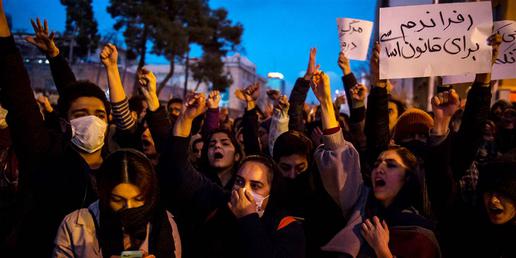
In 2020 Iran dropped three places in Reporters Without Borders’ World Press Freedom index and is now ranked at 173 out of 180 countries. The precarious political situation at the start of the year, compounded after the Revolutionary Guards shot down a Ukrainian Airlines passenger plane on January 8, killing all 178 people onboard, led to successive crackdowns by the Islamic regime on both mainstream media and social media. A spate of raids on journalists’ homes took place across Iran, with reporters’ computers, cell phones, tablets and other personal belongings seized by the authorities.
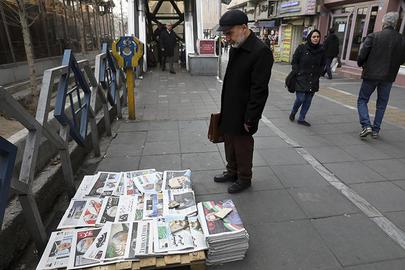
Then came the coronavirus outbreak, with the authorities and the Revolutionary Guards making sustained efforts to stifle accurate reporting of the pandemic. From mid-February journalists were threatened and harassed on the phone by Iran’s cyber police, with the Ministry of Health filing complaints against them and eventually banning the publication of any information about coronavirus it had not endorsed. In March, Iran’s prosecutor-general announced that unauthorized publications would be treated as an attack on national security. By fall 2020 around 6,000 people were said to have been arrested on the basis of social media comments alone. This censorship has impeded public understanding of the Covid-19 situation in Iran and hindered accurate, factual analysis by experts at a critical time.

Throughout 2020 journalists, activists and writers faced detention and prosecution for publicly engaging with issues proscribed by the regime. In late April the administrator of the Iranian Labor News Agency (ILNA)’s Telegram channel was arrested for publishing a cartoon about traditional medicine. Eight journalists were detained in less than a month in November-December 2020, including the photographer Negar Masoudi, apparently for her photos of women who had been targeted in acid attacks, and Hamed Pourmand, a sports journalist who had written critically about a local factory owner. Even seemingly innocuous posts by Iranian creatives have drawn the regime’s ire: parkour champion Alireza Jalpaghi was arrested in May after he appeared in a publicity-stunt video kissing a woman on a rooftop, and teenage Instagram sensation Sahar Tabar, who gained notoriety online for her “zombie” make-up selfies, was sentenced to 10 years in prison in December on “corruption” charges.
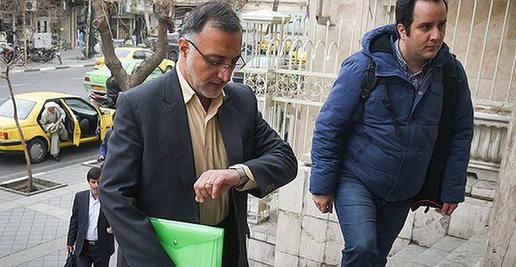
This year finally saw the establishment of a “Press and Political Crimes Jury”, which according to the Iranian constitution should have been in place since 1979. For more than 40 years and until today, not a single journalist or activist in Iran has had their legal right to a jury trial upheld, with their cases heard behind closed doors in the Revolutionary Courts instead. In October the first two beneficiaries of this new facility were both politicians: the MP Alireza Zakani and the presidential advisor Hessamoddin Ashena, who were respectively charged with “spreading lies” for critical comments made during a TV interview and on Twitter.

In November 2020, the veteran Iranian investigative reporter Mohammad Mosaed was named in the Committee to Protect Journalists’ International Press Freedom Awards. The freelance journalist has covered topics such as embezzlement, corruption and labor protests in Iran. He was arrested last November after tweeting during the nationwide internet shutdown that aimed to block the November 2019 protests, then again in February 2020 for criticizing the government’s coronavirus response, and is now awaiting a summons to begin his jail sentence. The CPJ’s Middle East Coordinator Sherif Mansour told IranWire: “In one of the most censored countries in the world, he continues to find ways to operate using online tools. That shows courage.”
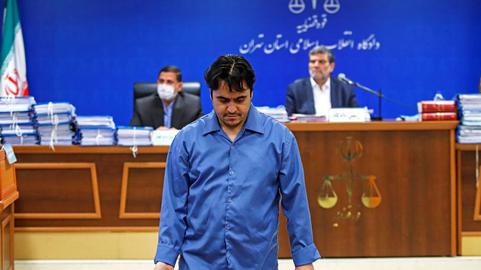
On December 12, the Iranian regime executed Ruhollah Zam. The father-of-two and renegade journalist in exile, who ran the Telegram channel Amad News, had been lured from France to Iraq last October, where he was arrested and brought back to Iran by the IRGC. Zam was jailed, tortured and forced to give a confession on Iranian state television before being sentenced to death in June 2020 by the Revolutionary Court on 13 separate charges. The case has horrified the international community and once again focused attention on the Islamic Republic’s criminal treatment of its critics, at home and abroad. In the immediate aftermath, BBC journalists also reported receiving death threats and harassment from Iranian sources, prompting the UN to intervene.
Ayatollah Ali Khamenei
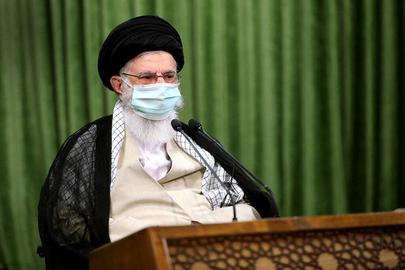
The Supreme Leader of the Islamic Republic of Iran wields colossal executive and decision-making power, to say nothing of his influence in the cultural sphere. Because the Islamic principle of Velayat-e Faqih (Guardianship of the Islamic Jurist), which underpins governance in Iran, Ayatollah Ali Khamenei has both the power to determine policy in the Islamic Republic and to force through or veto changes. As the most senior religious authority in the country, his leadership would have been pivotal in 2020, as the country reeled in the face of the shock, grief and loss of a large-scale epidemic.
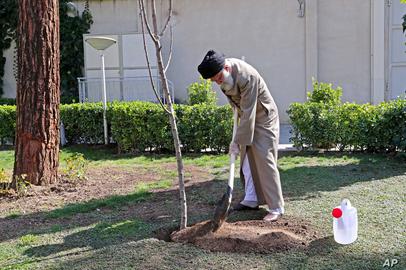
Instead, over the course of 2020, there was every sign that the Supreme Leader was not merely losing his grip on authority but on reality. Ever since the killing of IRGC Quds Force commander General Ghasem Soleimani on January 3, and since the first warning signs that SARS-CoV-2 had come to Iran, Khamenei seemed to be on a steady retreat from public life and discourse. Largely quarantined at home throughout the year, in his increasingly rare speeches expounding on Iranian affairs, the Supreme Leader often described the precise opposite of the actual situation.

It started early on January 17, when Khamenei led Friday prayers in Iran for the first time in eight years and used this occasion to claim the Ukrainian Airlines Flight 752 disaster had been “made up” by “British television and American radio”. Then in the early months of the pandemic Khamenei not only did not encourage Iranians to take sanitary precautions, but actively promoted disinformation. The day after Iran’s parliamentary elections in February, Khamenei declared coronavirus had been over-hyped by “enemy” media organizations to discourage Iranians from voting. In March he then wrote to the Chief of Staff for the Armed Forces suggesting Covid-19 was an act of biological warfare, before using his Norooz address on Sunday, March 22 to claim the virus was manufactured by the US “especially for Iranians, using Iranian genetic knowledge, gained from various means”. This fantasy was cited in an attempt to securitize the pandemic and divert attention from the government’s abject failure to control the spread of coronavirus.
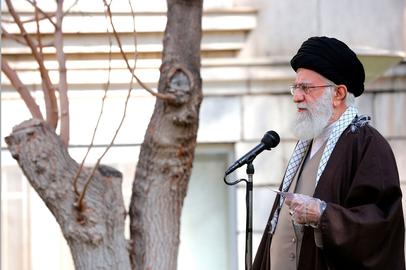
The Supreme Leader also continued to promote the idea of an isolationist “resistance economy” for Iran, belying the fact that, sanctions or no sanctions, Iran’s chicken crisis this fall showed that by virtue of its very topography, Iran relies on other countries for food security. Khamenei also kept up the bellicose line against Iran’s supposed “enemies”, using the Charlie Hebdo controversy in France as yet another opportunity to promote Holocaust denial and insisting after Joe Biden’s electoral victory in America that “enmity” against the US would continue – even as other Iranian officials tacitly welcomed news of the new president-elect. In November, he also expressed his wish for a “young revolutionary” to succeed Hassan Rouhani as president next year. Taken in sum, the Supreme Leader spent most of his dwindling public appearances this year harking back to a 40-year-old revolutionary agenda and squaring up to declared enemies, at a time when Iran needed leadership more than ever.
There have also been signs, though, that the tide may be turning. A close advisor to Grand Ayatollah Sistani, the most high-ranking Shia cleric, denounced the “cowardly” killing of Ruhollah Zam in December. Influential cleric Ayatollah Mahmoud Amjad asked Khamenei to repent, declaring him responsible for all the bloodshed in Iran since 2009 in an unprecedented attack. Discussions about a possible transfer of power – potentially to Khamenei’s second son, Mojtaba Khamenei – also swirled in December given the Supreme Leader’s protracted absences in 2020.
Religious Minorities
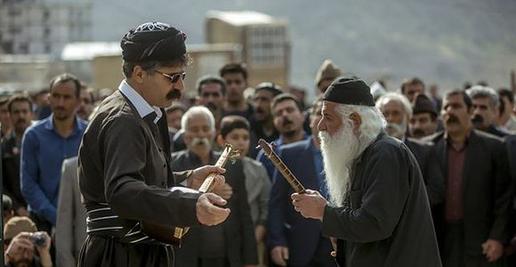
Throughout 2020 the coronavirus pandemic has pushed many other important news stories down the agenda, including ongoing injustices that continue to eat away at societies. This is true of the persecution of religious minority groups in Iran, which – apart from being unjust and inhumane – has stopped millions of people from reaching their full potential in Iranian society. In late fall 2020 IranWire launched a new drive to document abuses of religious minority groups in Iran: from discrimination against Mandaeans, to clerics stirring up animosity against Yarsanis in November, to a Christian couple forced to give up their adopted baby daughter because of their faith – and to one of our most bizarre stories of 2020, in which an episode of the American Christian TV series VeggieTales, which re-tells stories from the Bible using anthropomorphic vegetables, was pulled from Iranian state TV amid accusations of “Zionist infiltration”.

State-sponsored discrimination against members of the Baha’i community in Iran also continued in 2020. Eight Baha’is were summoned to prison in October for membership of “illegal organizations” and the following month, Baha’i would-be students were blocked from entering higher education in the country for the fortieth year in a row. Those who sat the national university entrance exams were met with the now-miserably familiar “Incomplete dossier” error message on logging in to view their results. A handful who managed to pass were then summoned for questioning and told to abandon the Baha’i faith to retain their places. Days later and without warning, security agents ransacked the homes of tens of Baha’is, confiscating their computers, phones, cash, religious books and ID cards.
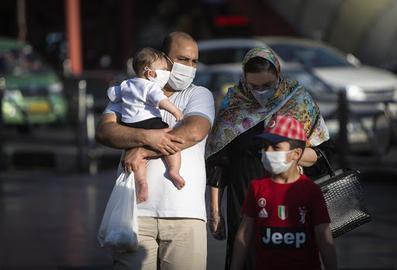
These actions have consequences for Iran. Wave upon wave of emigration by skilled professionals from religious minority groups has taken place since 1979. Other Iranians, who might have had a great deal more to give, have been murdered by the regime because of their non-Shia faith. In a series of articles launched in December, called For the Love of Their Country, IranWire sought to tell the stories of a series of remarkable and well-loved Baha’i doctors who, after the Islamic Revolution, either fled the country or were killed – taking all their medical expertise with them. In the midst of a pandemic, these tales are a timely reminder of what could have been in Iran, had the governance of the country been different. But also, they show us what could still be.
We thank all of our readers, supporters and collaborators for your valued support in 2020, and look forward to continuing to serve the Iranian community and human rights defenders in the year to come.
visit the accountability section
In this section of Iran Wire, you can contact the officials and launch your campaign for various problems




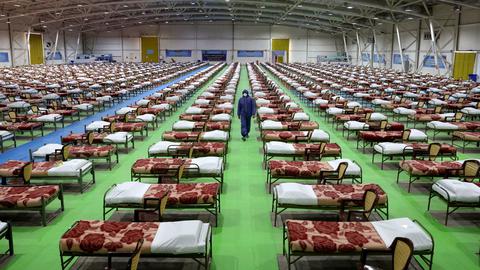




















comments